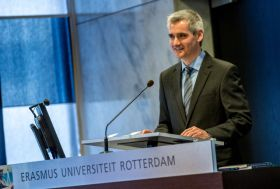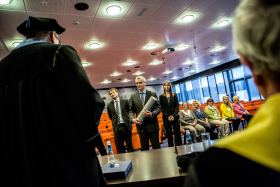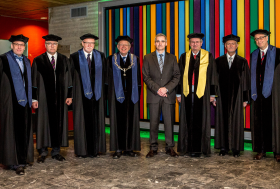PhD Defence: Leading Public Housing Organisation in a Problematic Situation
 Governments and their public organisations need to be adaptive and open to learning in order to deal with issues such as climate change and social injustice – and they need to adopt new ways of thinking to cope with the complexities, dynamics and human behaviour in the public sector. In his PhD dissertation entitled 'Leading Public Housing Organisation in a Problematic Situation', Jürgen Staadt reveals public organisations fail to answer the needs of society because of the way they apply problem-solving methods. They rely on traditional authoritarian organisations instead of developing democratic learning entities.
Governments and their public organisations need to be adaptive and open to learning in order to deal with issues such as climate change and social injustice – and they need to adopt new ways of thinking to cope with the complexities, dynamics and human behaviour in the public sector. In his PhD dissertation entitled 'Leading Public Housing Organisation in a Problematic Situation', Jürgen Staadt reveals public organisations fail to answer the needs of society because of the way they apply problem-solving methods. They rely on traditional authoritarian organisations instead of developing democratic learning entities.
Public housing in Europe is under pressure because governmental organisations fail to provide sufficient affordable accommodation to the most vulnerable members of society. In this way, the decisions and activities of an organisation such as a public housing provider affect the living conditions of future generations by influencing the sustainable development of a society. Staadt’s PhD dissertation ‘Leading Public Housing Organisation in a Problematic Situation: A Critical Soft Systems Methodology Approach’, reveals the internal culture of public organisations influences the policies they carry out, and thus influences society as a whole.
Staadt found the cultural structure of public housing organisations is shaped by a socio-political system that suffocates learning, aborts sense-making processes and represses efforts to cope with the situation. The constant development of a hierarchical structure lifts the most powerful person and their group of internal advisors into positions that are almost impossible for other organisational members or citizens to contest. This disrupts efforts to further democratise the organisation and prompts questions about authoritarian approaches, especially in the context of pressing societal problems.
 This power-laden environment within the organisation requires several methodologies, instead of relying on soft systems methodology (SSM). This suggests that SSM should leave its mere interpretive stance for a more flexible approach. The people within the organisation should collaborate to learn from problems in the past, and adjust their methodology and methods for current and future organisational or societal problems. This creates a continuous learning cycle that would help organisations to be more open-minded in their problem-solving.
This power-laden environment within the organisation requires several methodologies, instead of relying on soft systems methodology (SSM). This suggests that SSM should leave its mere interpretive stance for a more flexible approach. The people within the organisation should collaborate to learn from problems in the past, and adjust their methodology and methods for current and future organisational or societal problems. This creates a continuous learning cycle that would help organisations to be more open-minded in their problem-solving.
Staadt defended his dissertation in the Senate Hall at Erasmus University Rotterdam on Thursday, 20 March 2014. His supervisor was <link people slawomir-magala>Slawomir Magala, Professor of Cross-cultural Management. Other members of the Doctoral Committee were Professor Gerhard Fink (Vienna University), Professor Brendan McSweeney (Royal Holloway University of London), <link people eric-van-heck>Professor Eric van Heck, <link people lucas-meijs>Professor Lucas Meijs (both of Erasmus University Rotterdam) and Professor Rodney Turner (Kingston University London).
About Jürgen Staadt
Jürgen Staadt holds a Master´s degree in International Project Management and a degree in architecture. After having gained extensive experience in the housing sector, Jürgen started work in 2006 at a leading public housing provider within the European Union. Based on the problems discovered within this organisation, he started his doctoral studies at the Skema Business School in Lille, France in 2007. The intention was to provide help for the public entity and its inherent societal problems. In 2010, he finished the programme but decided to continue with his doctoral research under the supervision of Slawomir Magala in order to further pursue his research project in organisational dynamics, sense-making processes and behaviour. The transition to Erasmus University Rotterdam was supported by the programme director in Lille, Rodney Turner, who was professor of project management between 1997 and 2005 at the Erasmus University. In 2010, Jürgen was awarded the IPMA Outstanding Research Contribution in the category of young researcher. One of his papers was published in 2012 in the International Journal of Managing Projects in Business. Jürgen’s special research interests include organisational behaviour and in particular issues such as politics, power and oppression in the context of pressing societal problems.
Abstract of Leading Public Housing Organisation in a Problematic Situation
The challenges ahead, such as climate change and social injustice, require governments and their public organisations to be adaptive and open to learning. This necessitates the adoption of new ways of thinking so as cope to with complexity, dynamics as well as behavioural aspects. The leading public housing organisation used in this single case study is connected with disciplines such as transport for example which suggests the adoption of a systems thinking approach. However, internal socio-political problems and the willingness of the organisational members to improve the situation call for an intervention based on soft systems thinking. The employee/researcher of this ethnographic study applied soft systems methodology (SSM) so as to collaboratively investigate the problematic situation.
 The intervention was supported by the configuration model of organisational culture, the model of organisation life cycles as well as complex responsive processes of human relating theory. Four different research phases were performed which allowed each part of the process to be informed by the analysis of the one preceding it, thus creating a documented learning process. The main sources of information used in the intervention were participant observation, interviews, documents and group work. The third research phase demonstrated that the activation of the SSM learning cycle was and still is feasible as well as desirable but is jeopardized by politics and power. Since SSM could not properly respond to the oppressive social system within the organisation, the fourth research phase developed towards a multi-methodology approach combining SSM with cognitive mapping. The development of a purposeful activity model for strategic redesign within this last phase suggests that SSM should leave its mere interpretive stance for a more flexible approach. The results reveal the usability of the logic-based stream of SSM in the modelling process but also highlight the weakness regarding its stream of cultural analysis. Only through the application of the configuration model of organisational culture was it possible to highlight the impact of the disturbed organisational culture on the whole organisation.
The intervention was supported by the configuration model of organisational culture, the model of organisation life cycles as well as complex responsive processes of human relating theory. Four different research phases were performed which allowed each part of the process to be informed by the analysis of the one preceding it, thus creating a documented learning process. The main sources of information used in the intervention were participant observation, interviews, documents and group work. The third research phase demonstrated that the activation of the SSM learning cycle was and still is feasible as well as desirable but is jeopardized by politics and power. Since SSM could not properly respond to the oppressive social system within the organisation, the fourth research phase developed towards a multi-methodology approach combining SSM with cognitive mapping. The development of a purposeful activity model for strategic redesign within this last phase suggests that SSM should leave its mere interpretive stance for a more flexible approach. The results reveal the usability of the logic-based stream of SSM in the modelling process but also highlight the weakness regarding its stream of cultural analysis. Only through the application of the configuration model of organisational culture was it possible to highlight the impact of the disturbed organisational culture on the whole organisation.
The investigation suggests that power relations are no longer negotiated between organisational members once the outsider group is properly restrained or stigmatised i.e. cut off from thematic patterning. These characteristics are exacerbated by ingrained beliefs with regard to the traditional authoritarian or hierarchical view, which suggests to management that the only solution to the organisational problem is the application of more control and the use of ‘whips’. In contrast, the new approach proposed in this thesis is built around the findings, the models elaborated such as the relevant systems for constant improvement and collaborative learning and in particular the flexible methodological approach. The creation of a continuous learning cycle offers the possibility to collectively approach societal problems and to elaborate an alternative to hierarchical organisations.
- <link doctoral-programme phd-in-management phd-projects detail>Download Jürgen's dissertation
- View photos of his defence
Photos: Chris Gorzeman / Capital Images


